- Home
- Gustave Aimard
The Guide of the Desert
The Guide of the Desert Read online
E-text prepared by Camille Bernard and Marc D'Hooghe(https://freeliterature.org) from page images generously made available byHathiTrust Digital Library (https://www.hathitrust.org/digital_library)
Note: Images of the original pages are available through HathiTrust Digital Library. See https://babel.hathitrust.org/cgi/pt?id=uc1.b3750786#view=1up;seq=9
GUIDE OF THE DESERT
by
GUSTAVE AIMARD
And Edited by Percy B. St. John
LondonJohn and Robert MaxwellMilton House, Shoe Lane, Fleet Streetand35, St. Bride Street, Ludgate Circus.
(From the Collected Works 1863-1885)
CONTENTS
I. A PRISONER. II. THE GAUCHO. III. THE RANCHO. IV. THE FAZENDA DO RIO D'OURO. V. O SERTAO. VI. TAROU NIOM. VII. THE MARQUIS DE CASTELMELHOR. VIII. A NOBLE BANDIT. IX. THROUGH THE DESERT. X. THE GUAYCURUS. XI. A STRATEGIC ASSAULT. XII. THE PAYAGOA VILLAGE. XIII. THE CHASE. XIV. DISASTER. XV. EL VADO DEL CABESTRO. XVI. FRIENDS AND ENEMIES. XVII. THE PEONS. XVIII. SAN MIGUEL DE TUCUMAN. XIX. LA MONTONERA. XX. THE SOIREE.
NOTICE.
Gustave Aimard was the adopted son of one of the most powerful Indian tribes, with whom he lived for more than fifteen years in the heart of the Prairies, sharing their dangers and their combats, and accompanying them everywhere, rifle in one hand and tomahawk in the other. In turn squatter, hunter, trapper, warrior, and miner, Gustave Aimard has traversed America from the highest peaks of the Cordilleras to the ocean shores, living from hand to mouth, happy for the day, careless of the morrow. Hence it is that Gustave Aimard only describes his own life. The Indians of whom he speaks he has known--the manners he depicts are his own.
CHAPTER I.
A PRISONER.
Loading in the environs of Barbara Bay, Cape Horn, I was surprised,with two companions, by the Patagonians, and made prisoner. I had thepain of witnessing from the cliffs the departure of the whaler on boardof which I had entered at Havre as harpooner.
It was with a deep pang of grief, and eyes bathed in tears, I saw thewhite sails of my ship disappear on the horizon, and the sea becomesolitary once more.
I little suspected that the vessel I then saw for the last time wasdoomed to some terrible fate. Nothing was ever heard of her again.
Two hours later, stripped of our clothes and tied by the wrists to thetails of Patagonian horses, we were carried off into the interior ofthe country.
The Patagonians, with regard to whom travellers relate so many fables,are neither so gigantic nor so evil as generally represented.
They are sturdily independent. The least yoke galls them, and ratherthan submit to the will of a chief, they rush off into exile, andsubmit to the most terrible privations.
We were not ill-used by our captors, but I was at length alone. One ofmy companions went raving mad, the other committed suicide. I was keptalive, I believe, by the spirit of hope.
I was twenty years of age, and had a constitution of iron, as well asa buoyancy of spirits, a boldness and firmness, which saved me frommyself, by permitting me to look upon my position in its true light.Cruel as it was, it was far from being desperate.
My first care was, by invariable complaisance, to secure the goodwillof the savages, in which I succeeded pretty well, more easily, indeed,than I should have dared to hope.
However, when in the evening after a whole day's journey in theinterminable steppes of Patagonia, I threw myself, overcome withfatigue, before the bivouac fire, while the savages laughed and sangamong themselves, I often felt my heart on the point of bursting byreason of the efforts I made to suppress my sighs.
How many times have I felt my courage fail! How many times has thethought of suicide burst upon my mind! But, always at the mostcritical moment, the hope of deliverance arose to put new life intomy heart; my sufferings were calmed little by little, my frame ceasedto be agitated, and I slept, murmuring in a gentle voice one of thosenational refrains which are, for the exile, a sweet and far-off echo ofthe absent country.
Fourteen months thus passed away, hour by hour, second by second, in anincessant and frightful torture.
Always on the watch to seize an opportunity of escaping, but notwishing to leave anything to the risk of failure, I had had thegreatest care not to awaken the drowsy mistrust of the Patagonians.I always affected, on the contrary, not to wander too far from thetribe; so the Indians had at last come to allow me to enjoy comparativeliberty amongst them; and instead of compelling me to follow themon foot, they decided of their own accord to allow me to mount onhorseback.
It was only on horseback that I could dream of escaping.
The Patagonians are some of the first horsemen in the world. In theirschool I made rapid progress; and, however wild and vicious might bethe horse that they gave me, in a few minutes I subdued him, and mademyself completely his master.
Our wandering and purposeless journeys conducted us at last to aboutten leagues from the Carmen of Patagonia, the most advanced fortconstructed by the Spaniards on the Rio Negro, at the extreme frontierof their former possessions.
The troop camped for the night at a little distance from the river,near an abandoned farm.
The opportunity for which I had waited so long had come at last. Iprepared to profit by it, convinced that if I did not escape now, Ishould die a slave.
I will not fatigue the reader with the details of my flight; I willcontent myself with simply saying that after a devious journey, whichlasted seven hours, and during which I constantly felt the smokingnostrils of the horses on my track, on the croup of the one I rode;after having escaped twenty times by a miracle from the bolas which thePatagonians threw at me, and from the sharpened points of their longlances, I came unexpectedly upon a patrol of Buenos Airean horsemen, inthe midst of whom I fell fainting, overcome by fatigue and excitement.
The Patagonians, suddenly taken aback by the appearance of white men,whom the high grass had hidden from them till that time, turned tailwith fright, and fled away, howling with fury.
I was saved!
By my singular equipment--all the clothing I had on was a frazada(blanket) in rags, fastened round the body by a leather strap--thesoldiers at first took me for an Indian, a mistake which was renderedmore natural by my complexion, bronzed by the severity of the seasonsto which I had been so long exposed and which had assumed nearly thecolour of copper. As soon as I regained consciousness, I hastened todisabuse them as well as I could, for at that time I could only speakthe Spanish language very imperfectly.
The brave Buenos Aireans listened with signs of the liveliest sympathyto the recital of my sufferings, and lavished on me the kindestattentions.
My entry into Carmen, in the midst of my preservers, was a veritabletriumph.
It required nearly a month to enable me to recover from the longsufferings which I had endured, and from the privations of all kinds towhich I had, during so long a period, been condemned; but, thanks tothe attention by which I was surrounded, and especially thanks to myyouth and the vigour of my constitution, I at last regained my health.
The governor of Carmen, who had become much interested in me, agreed atmy request to give me a passage on board a little Buenos Airean brig,then anchored before the port, and I left for Buenos Aires, with thefirm intention of returning to France as soon as possible--so much hadthe rude apprenticeship I had had to American life disgusted me withtravel.
But it was not to be so, and before again reaching France--I was towander for twenty years an adventurer in all the countries of theworld--from Cape Horn to Hudson's Bay, from China to Oceania, and fromIndia to Spitzburg.
On my arrival in Buenos Aires, my first care was to present myself tothe French consul, to ask of him the means of returning to Europe.
I was well received by the consul, who, on proofs of my identity,immediately informed me that there was no French ship in the harbour,but that need not disquiet me, since my family not receiving news ofme, and fearing that I might find myself in a difficult position fromthe want of money, if any misfortune had happened to me during myvoyage, had written to all our agents in foreign countries, so thatanyone to whom I might present myself might give me, on my demand,a sum adequate to supply my wants, and put me in a position, if Iwished it, to try my fortune where chance should have conducted me. Heconcluded by adding that he held at my disposal the sum of 25,000f.,and that he was ready to give it me immediately.
I thanked him, and only accepted three hundred piastres.
Some months passed, during which I made several agreeableacquaintances, and perfected myself in the study of the Spanishlanguage.
On several occasions the consul had done me the kindness to inform methat if I wished to leave for France, it would entirely depend upon myown will; but each time, under some pretext or other. I declined hisoffer, not being able to resolve to leave forever that land where I hadsuffered so much, and to which, for that very reason, I was attached.
It is not with impunity that one has once tasted the wild pleasuresof independent, nomadic life, and breathed in liberty the embalmedatmosphere of the high savannahs! I felt arising within me the passionof an adventurer, and suffered a secret horror at the thought ofrecommencing the colourless, circumscribed, and mean existence to whichEuropean civilisation would have bound me.
And then I had bound myself in friendship with the gauchos. I madeexcursions with them into the pampas, slept in their ranches,hunted wild oxen and horses; all the poetry of the desert had takenpossession of me, and I only wished to return into the savannahs andvirgin forests, whatever might be the consequences to me of such adetermination.
In a word, one day, instead of embarking, as I had almost promised theconsul, I went to him, and explained my intentions.
The consul neither blamed me, nor gave me his approbation, butcontented himself with shaking his head with the melancholy smile of aman in whom experience had killed all the illusions of youth, countedout to me the sum I asked of him, shook my hand with a sigh of regretand of pity, and, my business being at an end, I never saw him again.
Four days later, mounted on an excellent wild horse, and accompanied byan Indian Guaranis, whom I had engaged to serve me as a guide, I leftBuenos Aires with the intention of proceeding by land to Brazil.
What business had I at Brazil?
I myself did not know.
But it is neither my history, nor that of my sensations, that I relatehere; all which precedes has no other design but that of preparingfor the recital, unhappily too true, that I now undertake, and which,without that prelude, would not perhaps have been so clearly explainedas is necessary to its being clearly understood. Leaping, then, at asingle bound, over some hunting adventures of too little importance tomention, I will transport myself to the banks of the Uruguay, a littleabove the Salto, four months after my departure from Buenos Aires, andI will enter immediately on the narrative.
After a rather fatiguing day, I stopped for the night in a pagonal,half-inundated by reason of the sudden overflowing of the river, andwhere it was necessary to go into the water nearly up to the horse'sbelly, in order to gain a dry spot. For some days the Guaranis, whomI had engaged at Buenos Aires, appeared to obey me with repugnance;he was sad, morose, and answered only in monosyllables the questionsI was sometimes obliged to put to him. This turn of mind in my guidedisquieted me, as, knowing very well the character of the Indians, Ifeared he might plot some treason against me; therefore, feigning notto perceive his change of humour, I kept myself on my guard, resolvedto blow his brains out at the least hostile demonstration on his part.
As soon as we were encamped, the guide, notwithstanding the suspicionsI had conceived of him, manifested great activity in gathering dry woodto light the fire for the evening, and to prepare our modest repast.
The supper over, each enveloped himself in his blanket, and gavehimself up to repose.
In the middle of the night I was suddenly awakened by a strange noise;my first movement was to seize my gun, and to look around me.
I was alone; my guide had disappeared.
The night was dark, the fire extinguished; to complete my discomfiture,my bivouac was about to be invaded by the waters of the river, theoverflowing of which continued with extreme rapidity.
I had not a moment to lose. I rose in haste, and leaping into thesaddle, I darted, with a loose rein, in the direction of a neighbouringhill, the black outline of which was clearly marked on the sombrebackground of the sky.
Here I was in comparative security. I passed the rest of the nightawake, as well to watch for the wild beasts, the howlings of whichI heard about the place where I had sought a refuge, as because mypresent position had become critical--alone, abandoned in a desertcountry, and completely ignorant of the route it was necessary to take.
On the rising of the sun, I examined the horizon around. As far as myview could reach, reigned the most complete solitude; nothing gave meground for hope, so wild and desolate appeared the landscape.
This uncertainty, however, from a singular disposition of mind, didnot seriously affect me; my position, without being pleasant, hadnothing in it positively sad in itself. I possessed a good horse, arms,supplies in abundance--what more could I desire? I, who for so longa time had aspired to the adventurous life of the gaucho and of thetrapper?
Accordingly I took in good part the desertion of my guide, and preparedmyself, half laughing, half railing against the ingratitude of theGuaranis, to commence my apprenticeship to the life of the desert.
My first care was to light a fire. I prepared a mate cimarron, that isto say, without sugar; and, refreshed by this warm drink, I mounted myhorse, with the design of seeking my breakfast by killing a head or twoof game, an easy thing in the locality in which I found myself; then Icarelessly resumed my adventurous route.
Some days thus passed. One morning, at the moment when I was preparingto light, or rather to rekindle, my bivouac fire to cook my breakfast,I suddenly saw several venados rise from the midst of the high grass,and, after having sniffed the wind, scamper away with extreme rapidity,passing at a pistol shot from the thicket where I had establishedmyself for the night; at the same instant a flight of vultures passedabove my head, uttering discordant cries.
Novice as I still was in my new occupation, I instinctively understoodthat something extraordinary was passing not far from me.
I made my horse lie down, tied my girdle round his nostrils to preventhim neighing, and stretching myself on the ground, I waited with myfinger on the trigger of my gun, my heart palpitating, and eye and earon the watch. Carefully scanning the undulations of the high grass ofthe plain stretched out before me, I was ready for every event.
I was crouching in the middle of a nearly impenetrable thicket. Onthe outskirts of a wood which formed a kind of oasis in this desolatewilderness, I found myself in an excellent ambuscade, and perfectlysheltered from the danger I felt was approaching.
I did not deceive myself. Scarcely a quarter of an hour had passedsince the venados and the urubus had given me the first hint, thanthe noise of a precipitate flight distinctly reached my ear. I soonperceived a horseman lying on the neck of his horse, flying with wildrapidity, and coming in a straight line towards the wood in which I wasconcealed.
The horseman, when he had come within twenty paces, suddenly pulledup his horse, leaped to the ground, and making a shelter of a rockyprojection, shrouded by a cluster of trees, loaded his gun, and,leaning his body forward, appeared to listen to the sounds of thedesert.
This man, as far as it was possible for me to assure myself of it by ahasty glance at him, appeared to belong to the white
race; he was aboutthirty-five or forty years of age; his energetic features, animated byhis rapid journey, and by emotion, were handsome, regular, stamped witha certain nobility, and uncommon boldness; his figure was rather belowthe middle height, but well made; his large shoulders denoted greatvigour; he wore the costume of the gauchos of the Banda Oriental, acostume that I had myself adopted--a maroon jacket, a white waistcoat,a sky blue chirapa, white calzoncillos with fringe, under blue clothtrousers, a poncho thrown over the left shoulder, a knife sheathedin the girdle of the chirapa behind his back, a red Phrygian bonnet,slouched over the forehead, and allowing to escape ringlets of thickblack hair, which fell in disorder on his shoulders.
Suddenly the man threw himself backward, put his knee to the ground,and shouldered his gun.
Ten horsemen started up, as if by enchantment, emerging with extremerapidity from the grass which, up to that time, had concealed them frommy view, and precipitated themselves, brandishing their long lances,flourishing their terrible bolas above their heads, and howling withfury, as they looked towards the spot where the gaucho was in ambush.
These horsemen were Indiae bravos.

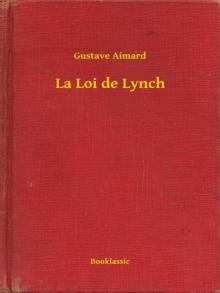 La loi de lynch. English
La loi de lynch. English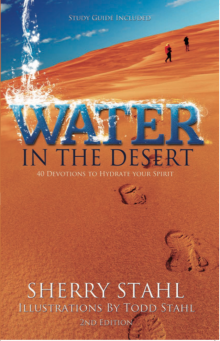 The Guide of the Desert
The Guide of the Desert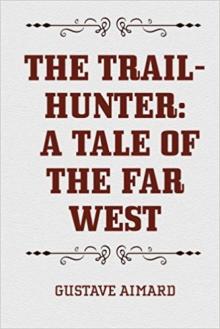 The Trail-Hunter: A Tale of the Far West
The Trail-Hunter: A Tale of the Far West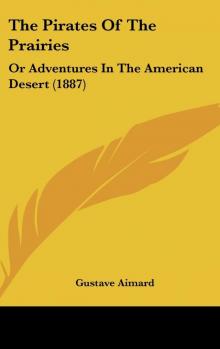 The Pirates of the Prairies: Adventures in the American Desert
The Pirates of the Prairies: Adventures in the American Desert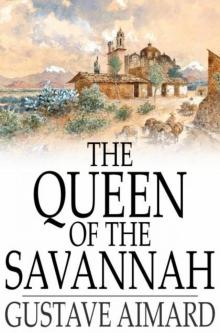 The Treasure of Pearls: A Romance of Adventures in California
The Treasure of Pearls: A Romance of Adventures in California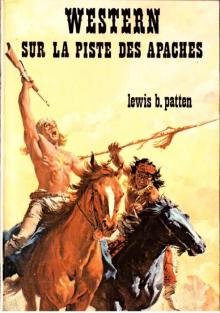 Les outlaws du Missouri. English
Les outlaws du Missouri. English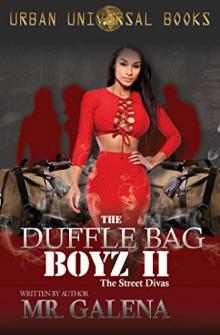 Les trappeurs de l'Arkansas. English
Les trappeurs de l'Arkansas. English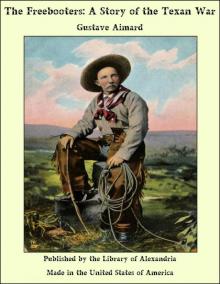 The Border Rifles: A Tale of the Texan War
The Border Rifles: A Tale of the Texan War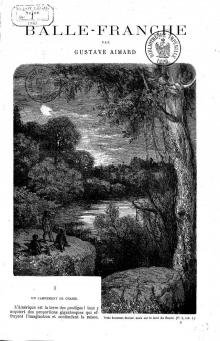 Balle-Franche. English
Balle-Franche. English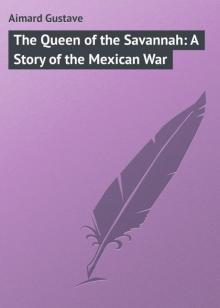 The Queen of the Savannah: A Story of the Mexican War
The Queen of the Savannah: A Story of the Mexican War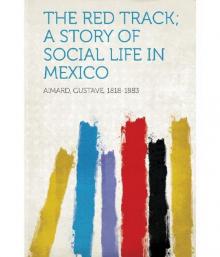 The Red Track: A Story of Social Life in Mexico
The Red Track: A Story of Social Life in Mexico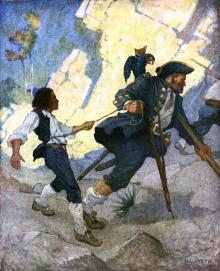 La fièvre d'or. English
La fièvre d'or. English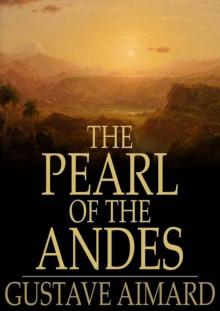 The Pearl of the Andes: A Tale of Love and Adventure
The Pearl of the Andes: A Tale of Love and Adventure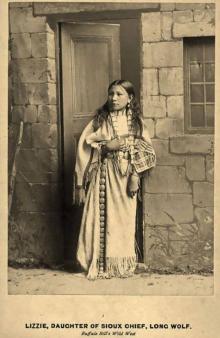 Les fils de la tortue. English
Les fils de la tortue. English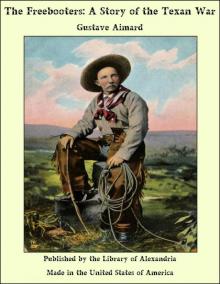 The Indian Chief: The Story of a Revolution
The Indian Chief: The Story of a Revolution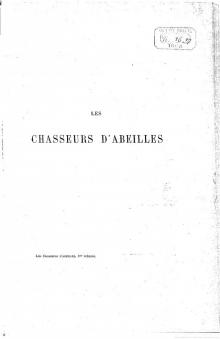 Les chasseurs d'abeilles. English
Les chasseurs d'abeilles. English The Adventurers
The Adventurers